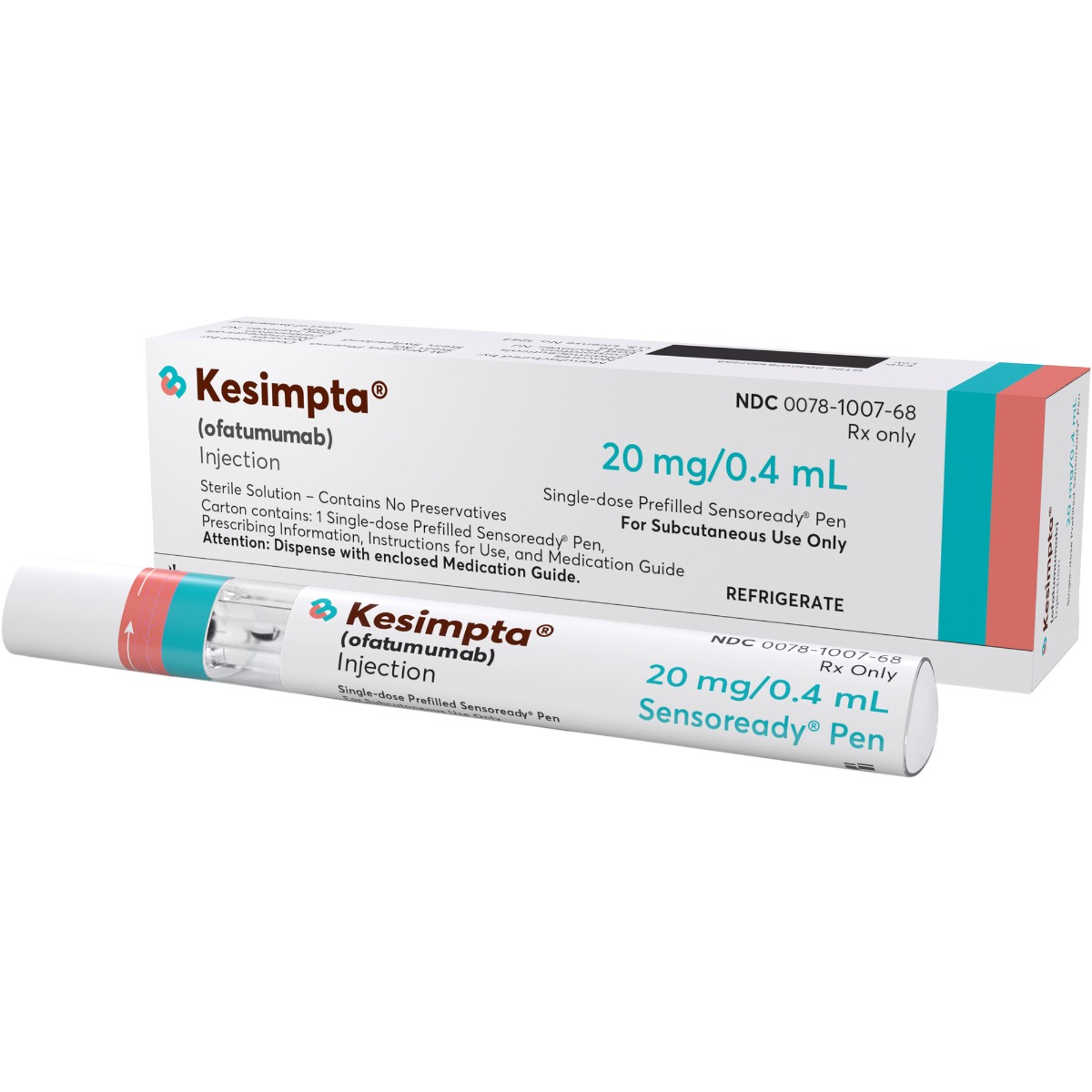Kesimpta (ofatumumab) vs Tyruko (natalizumab-sztn)
Kesimpta (ofatumumab) vs Tyruko (natalizumab-sztn)
Kesimpta (ofatumumab) is a CD20-directed cytolytic monoclonal antibody indicated for the treatment of relapsing forms of multiple sclerosis (MS), including clinically isolated syndrome, relapsing-remitting disease, and active secondary progressive disease. It is administered as a subcutaneous injection and is designed to target B cells, which are believed to play a key role in the pathophysiology of MS. On the other hand, Tysabri (natalizumab), which is referenced here as Tyruko (natalizumab-sztn), is an integrin receptor antagonist indicated for the same types of MS but is administered through intravenous infusion and works by inhibiting the migration of immune cells into the central nervous system, potentially reducing inflammation and damage. Patients should consider factors such as the method of administration, mechanism of action, and the risk profile, including the potential for progressive multifocal leukoencephalopathy (PML) with Tysabri, when deciding on the appropriate treatment for their condition in consultation with their healthcare provider.
Difference between Kesimpta and Tyruko
| Metric | Kesimpta (ofatumumab) | Tyruko (natalizumab-sztn) |
|---|---|---|
| Generic name | Ofatumumab | Natalizumab-sztn |
| Indications | Relapsing forms of multiple sclerosis (MS) | Relapsing forms of multiple sclerosis (MS), Crohn's disease |
| Mechanism of action | CD20-directed cytolytic antibody | Integrin receptor antagonist |
| Brand names | Kesimpta | Tyruko |
| Administrative route | Subcutaneous injection | Intravenous infusion |
| Side effects | Upper respiratory tract infections, injection-related reactions, headache | Headache, fatigue, urinary tract infections, infusion-related reactions |
| Contraindications | Hepatitis B infection, active infections | Progressive multifocal leukoencephalopathy (PML), hypersensitivity to natalizumab |
| Drug class | CD20-directed monoclonal antibody | Integrin receptor antagonist |
| Manufacturer | Novartis | Sandoz |
Efficacy
Kesimpta (Ofatumumab) Efficacy in Multiple Sclerosis
Kesimpta (ofatumumab) is a targeted B-cell therapy approved by the FDA for the treatment of relapsing forms of multiple sclerosis (MS), which include clinically isolated syndrome, relapsing-remitting disease, and active secondary progressive disease, in adults. As a CD20-directed cytolytic antibody, Kesimpta works by depleting B cells that are believed to play a role in the damaging inflammatory processes of MS, thereby reducing the frequency of relapses and slowing the progression of the disease. Clinical trials have demonstrated the efficacy of Kesimpta in reducing the annualized relapse rate (ARR) when compared to teriflunomide, another MS medication, with a significant reduction in relapse rates observed in patients treated with Kesimpta.
In addition to the reduction in ARR, Kesimpta has also shown efficacy in slowing the progression of disability, which is a critical aspect of MS treatment. In clinical studies, Kesimpta was associated with a lower risk of confirmed disability progression sustained for 3 and 6 months compared to teriflunomide. Moreover, Kesimpta has demonstrated a significant reduction in the number of new or enlarging T2 and gadolinium-enhancing lesions on MRI scans, indicating a decrease in disease activity.
Tyruko (Natalizumab-sztn) Efficacy in Multiple Sclerosis
Tyruko (natalizumab-sztn) is a biosimilar to the original natalizumab product and is used in the treatment of relapsing forms of multiple sclerosis (MS). Natalizumab, the active ingredient in Tyruko, is a monoclonal antibody that binds to the cell adhesion molecule α4-integrin and inhibits the migration of leukocytes across the blood-brain barrier. This action reduces the inflammation and damage in the central nervous system that characterizes MS. The efficacy of natalizumab in reducing the ARR and delaying the progression of disability in patients with relapsing MS has been well established through clinical trials and real-world data.
In clinical studies, natalizumab has shown a significant reduction in ARR compared to placebo, with patients receiving natalizumab experiencing fewer relapses. Furthermore, natalizumab treatment has been associated with a delay in the progression of disability, as measured by the Expanded Disability Status Scale (EDSS). Patients treated with natalizumab also exhibited fewer new or enlarging T2 hyperintense lesions and fewer gadolinium-enhancing lesions on MRI, indicating a lower level of MS disease activity. It is important to note that while Tyruko is expected to be similar in efficacy to the original natalizumab product, specific clinical data on Tyruko should be referred to for precise efficacy outcomes.
Regulatory Agency Approvals
Kesimpta
-
European Medical Agency (EMA), European Union

-
Food and Drug Administration (FDA), USA

Tyruko
-
European Medical Agency (EMA), European Union

-
Food and Drug Administration (FDA), USA

Access Kesimpta or Tyruko today
If Kesimpta or Tyruko are not approved or available in your country (e.g. due to supply issues), you can access them via Everyone.org.
How it works

Make an enquiry
Choose the medicine you want to buy, answer a couple of questions, and upload your prescription to speed things up. We’ll get back to you within 24 hours.


Make an enquiry
Choose the medicine you want to buy, answer a couple of questions, and upload your prescription to speed things up. We’ll get back to you within 24 hours.


Breeze through the paperwork
We'll guide you through the required documents for importing unapproved medicine, ensuring you have all the necessary information.


Get a personalized quote
We’ll prepare a quote for you, including medicine costs and any shipping, administrative, or import fees that may apply.


Receive your medicine
Accept the quote and we’ll handle the rest - sourcing and safely delivering your medicine.

Some text on this page has been automatically generated. Speak to your physician before you start a new treatment or medication.
Let's talk
If you have any questions, call us or send us a message through WhatsApp or email:
Contact us




